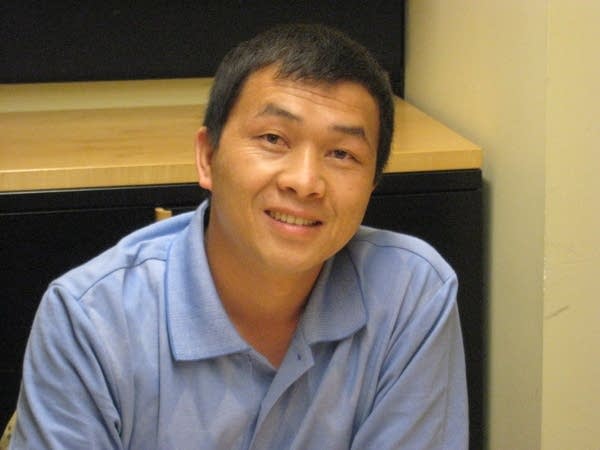New life challenging for some, rewarding for other Hmong immigrants
Go Deeper.
Create an account or log in to save stories.
Like this?
Thanks for liking this story! We have added it to a list of your favorite stories.

The latest wave of Hmong refugees to the Twin Cities began five years ago this week. Since then about 5,000 new Hmong residents have made their homes here.
Life for them is very different from what it was in Asia, where many lived in a refugee camp outside a Buddhist temple in Thailand. For some folks, the change has been good; for others it's been very challenging.
37-year-old Chou Lee arrived in the Twin Cities on a cold day in December 2004. He, his wife and their six young children initially stayed with his sister's family. But he said he felt he was crowding her so he moved his family into their own place shortly after.
Lee said he was isolated. He spoke no English and he had a hard time doing simple things like going to the grocery store and to the laundromat.
Turn Up Your Support
MPR News helps you turn down the noise and build shared understanding. Turn up your support for this public resource and keep trusted journalism accessible to all.

"At the time we don't drive, so when we want to go shopping we can't go," Lee said. "Very sad life in this country if you not speak English and you not drive."
At first Lee was dejected and didn't know if he'd make it.
"I don't want to stay in this country in the first three months," Lee said. "Sometimes I cry in my house."
But by the end of the first year Lee had his driver's license and was taking English classes and he said things began looking up.
"I started feeling maybe I can continue life in this country because I can drive my family to go shopping, to the laundry or we can go to the park when we want to play," he said.
Lee is still studying English and also plans to study carpentry. In addition, he's working at Neighborhood House in St. Paul, a multi-cultural and multi-lingual community center that provides basic needs and educational services. His wife also works part-time at a Hmong home health care agency. And while he says life is better now, it's no bowl of cherries.
"Very sad life in this country if you not speak English and you not drive."
He said he still doesn't make enough money to do everything he'd like and he echoes the complaint of many of the new Hmong arrivals: unlike in Thailand and Laos, life in the United States has too many bills.
But other refugees have had a less difficult transition. Thirty-year-old Kou Hang embraced the challenges he faced when he arrived in July of 2004.
Hang spoke almost no English then, but he and his brother were determined to learn the language well enough to take the written exam for their driving permits in English, even though they had the option to take it in Hmong.
"We decided to do English because we say, 'OK, this is the U.S., even when you take Hmong, when you see the sign on the street, it's not in Hmong words," Hang said.
It took three tries, but Hang passed the test. And now he can drive to his job every day at Hmong American Partnership where, over the past two years, he worked his way up from receptionist to employment counselor.
Hang lives in Saint Paul with his wife and five children. They recently hosted a cultural celebration to mark their youngest child's first birthday.

Dozens of family members and friends crammed into his apartment for the event, including Fue Her, a former co-worker who helped with Hang's resettlement. He said Hang has come a long way since 2004.
Her remembers when Hang first came to work at Hmong American Partnership. He said Hang would walk around the office with a dictionary trying to learn new words and complete his work at the same time.
"I think he accomplished a lot within five years, like I said, graduating from school," Hang said. "He hit that right off the bat when he basically arrived on the tarmac at the airport."
Her said the birthday party was a good sign.
"I think the more parties you have, I think that means life is good," Her said.
And Hang says life is good. He now plans to go to college to study social work. And he also wants another piece of the American dream -- he wants to buy a house.
While Hang has done well, resettlement has been much more challenging for some members of the older generation, many of whom don't speak English and can't work.
Seng Yang, a refugee resettlement coordinator with Neighborhood House in Saint Paul, said some refugees in their 40s, 50s and 60s have to relearn the fundamentals of life as they tackle a new language and an unfamiliar system.
"You have to be a baby, try to walk, crawl, and then stand up and then go to work and then take care of yourself," Yang said. "It takes a long time."
Yang said it could take 10 to 20 years for the latest arrivals to adjust to the new culture in their new country.




